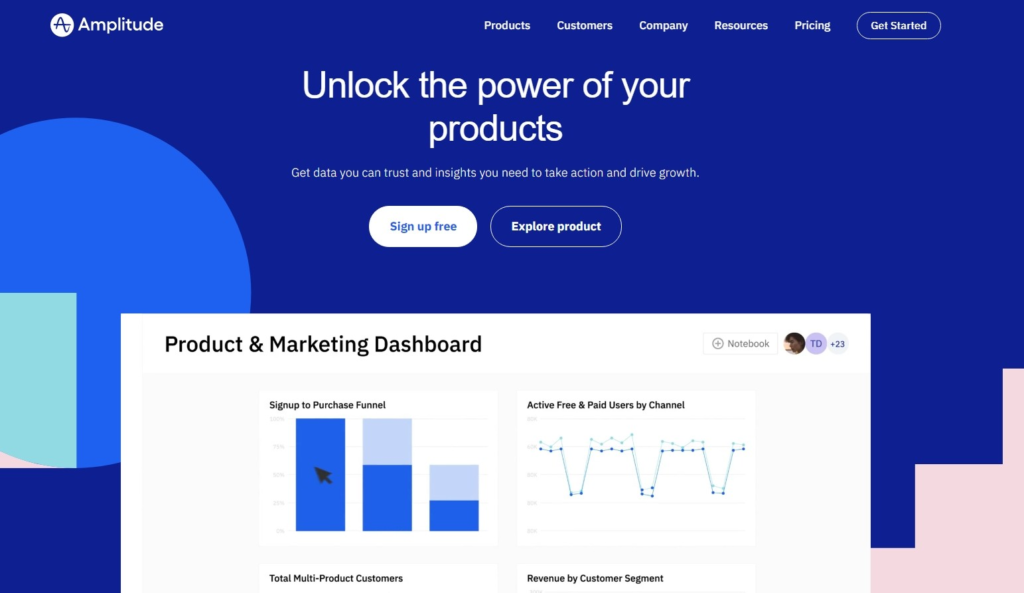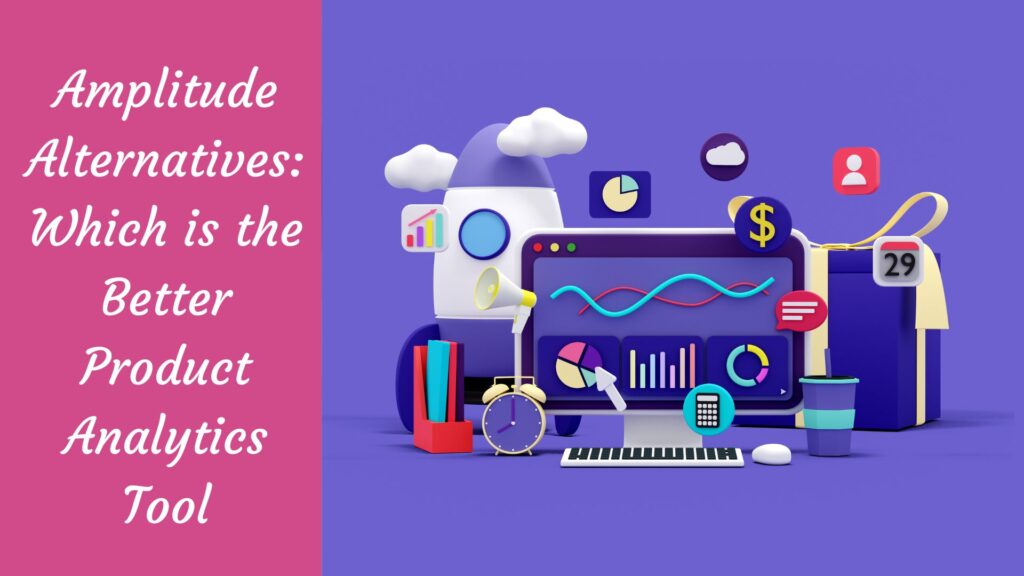In today’s digital world, businesses continuously seek ways to better understand their users and enhance their product offerings. One way to do this is by using product analytics tools. These tools give companies valuable insights into user behavior, allowing them to optimize their products based on actual data and drive growth.
While several product analytics tools are available, Amplitude has gained significant popularity. However, every business is unique and may require different features from an analytics tool. Therefore, it’s essential to explore other alternatives as well.
This blog post delves into Amplitude and its top alternatives, comparing features, pricing, and usability to guide your decision-making.
What is Amplitude?

Amplitude, a top product analytics platform, helps businesses track and analyze user behavior on digital products. It offers real-time insights for data-driven decisions that enhance user experience and boost engagement.
Whether you want to understand how users navigate your app, identify drop-off points, or measure the impact of new features, Amplitude has got you covered.
Key Features of Amplitude

User Behavior Tracking
One of the standout features of Amplitude is its ability to track individual user behavior across different platforms. This means you can see how users interact with your product on mobile devices, desktops, and even smart TVs. You can track which features, how often they are used, and where they encounter issues. This granular level of detail helps you understand your users better and tailor your product to their needs.
Funnel Analysis
Amplitude also provides powerful funnel analysis capabilities. You can create custom funnels representing different user journeys within your product and analyze how users move through these funnels. You can identify where users drop off and make necessary improvements to enhance conversion rates.
Cohort Analysis
Amplitude’s cohort analysis feature allows you to group users based on specific characteristics or behaviors. For example, you can create a cohort of users who signed up for a free trial and track their behavior over time. This helps you understand patterns, predict future behavior, and tailor your marketing strategies accordingly.
Top Amplitude Alternatives
While Amplitude is a robust tool, it may not fit every business’s needs. Here are some of the leading alternatives:
Mixpanel
Mixpanel is another popular user analytics platform. Like Amplitude, it provides insights into user engagement but stands out with its powerful A/B testing capabilities. With Mixpanel, you can experiment with different product features and measure their impact on user engagement.
Pros of Mixpanel
- A/B Testing Capabilities: Mixpanel excels in its A/B testing features, allowing businesses to experiment with different versions of their product and directly measure the impact on user engagement.
- Intuitive User Interface: The platform is known for its user-friendly interface, making it accessible for team members regardless of technical proficiency.
- Detailed Event Tracking: Mixpanel allows for in-depth event tracking, enabling businesses to monitor specific interactions within their product for a detailed analysis of user behavior.
- Advanced Segmentation: Users can segment their data based on various criteria, providing a more nuanced understanding of user actions and preferences.
Cons of Mixpanel
- Pricing: While Mixpanel offers a free tier, its pricing can scale up quickly as a business’s data needs grow, potentially making it less accessible for smaller companies.
- Learning Curve: Despite an intuitive interface, the depth of Mixpanel’s features means there can be a significant learning curve to leverage its capabilities fully.
- Limited Customization in Reports: Some users have reported that while Mixpanel’s reporting capabilities are strong, there can be limitations in how reports can be customized or manipulated.
- Data Export Restrictions: Exporting data from Mixpanel for use in external systems can be challenging, limiting flexibility for businesses that use multiple analytics tools.
Heap
Heap automates the data collection process, allowing businesses to track all user interactions from clicks to swipes without requiring manual event tracking setup. This radical approach ensures no data is missed and businesses can make comprehensive analyses.
Pros:
- Automatic Data Collection: Heap’s automatic tracking captures every user action, eliminating the need for predetermined events. This ensures comprehensive data collection and simplifies analytics.
- Retroactive Analytics: Since all data is automatically collected, you can analyze past interactions even if you hadn’t specifically set up tracking for those metrics.
Cons:
- Overwhelming Data Volume: The vast amount of data collected automatically can be overwhelming and may require additional effort to filter and find relevant insights.
- Learning Curve: While powerful, Heap’s interface and vast capabilities can present a steep learning curve for new users unfamiliar with data analytics tools.
Segment
Segment is a customer data platform that simplifies data collection, management, and routing. It acts as a single hub for customer data, empowering businesses to provide personalized experiences based on user interactions across various platforms.
Pros:
- Unified Customer View: Segment provides a cohesive view of the customer by collecting data from multiple sources and unifying it into a single customer profile.
- Easy Integration: With its ability to integrate with a wide range of tools and platforms, Segment makes it easy to sync and manage data across different marketing, analytics, and data warehousing services.
Cons:
- Complex Setup for Advanced Features: The Segment’s more powerful features can require a complex setup, potentially needing developer assistance.
- Cost: While Segment offers powerful capabilities, its pricing can be a barrier for small to medium-sized businesses or startups with limited budgets.
Pendo
Pendo focuses on improving product experiences through in-app messages, guides, and analytics. It’s especially valuable for businesses enhancing user onboarding, education, and feedback collection.
Pros:
- User Onboarding and Education: Pendo excels at creating in-app messages and guides to improve user onboarding and ongoing education.
- Feedback Collection: Integrated feedback tools simplify gathering user insights, prioritizing feature requests, and tracking user satisfaction over time.
Cons:
- Primarily In-App Focused: Pendo’s features are most powerful within the context of in-app interactions, which may limit its utility for businesses looking for a broader analytical scope.
- Learning Curve: Like many analytics platforms, Pendo has a learning curve, particularly for setting up and customizing in-app messages and guides.
Comparison of Amplitude Alternatives
Choosing the right product analytics tool for your business depends on several factors. Here’s how Amplitude and its alternatives stack up:
Features
While all these tools provide similar functionalities, each has unique features that set them apart. For instance, Heap’s automatic data capture can save time and resources, while Segment’s integrations can help you centralize your data.
Mixpanel stands out with its A/B testing capabilities, and Pendo’s user feedback features provide valuable qualitative insights.
Pricing
Pricing is another crucial factor to consider. Both Amplitude and Mixpanel offer free plans for startups, making them accessible to businesses of all sizes. On the other hand, Heap and Pendo only provide custom pricing, which might be more suitable for larger businesses with specific needs.
Usability
The usability of these tools can significantly impact their effectiveness. While Amplitude is known for its intuitive interface, some users find navigating Heap’s interface challenging. Therefore, it’s essential to consider your team’s technical skills and choose a tool they can use efficiently.
Upgrade Your SaaS Onboarding Experience with OnboardSaaS
Are you looking to enhance your software service’s onboarding process? Do you want to create a seamless user experience that boosts customer satisfaction and increases retention rates? Look no further!
At OnboardSaaS, we create customised, engaging, and effective onboarding experiences for SaaS businesses. Our solutions are designed to guide your users through every step of the journey, from sign-up to becoming power users.
But don’t take our word for it. Try us out today and see the difference a professional onboarding experience can make for your SaaS business.
Click here to start improving your onboarding process with OnboardSaaS!
Conclusion
Choosing the right product analytics tool depends on your needs and resources. While Amplitude is a comprehensive and user-friendly tool, alternatives like Mixpanel, Heap, Segment, and Pendo offer unique features that might better suit your business.
By carefully considering each tool’s features, pricing, and usability, you can find the right tool to provide valuable insights into user behavior, help you optimize your product, and ultimately drive growth.
FAQs
What are some of the top alternatives to Amplitude for product analytics?
Some of the top alternatives to Amplitude include Mixpanel, Heap, Pendo, and FullStory. These platforms offer similar features to Amplitude, such as user behavior tracking, funnel analysis, and cohort analysis. Still, each has unique strengths that may make it a better fit for certain businesses.
Why would a company consider using an alternative to Amplitude?
While Amplitude is a robust and comprehensive product analytics tool, it may not meet every company’s needs or budget constraints. For instance, some companies might prefer Heap’s automatic data capture feature, while others might find value in Pendo’s user feedback capabilities.
How does Mixpanel compare to Amplitude as a product analytics tool?
Mixpanel is similar to Amplitude, offering user behavior tracking and funnel analysis features. However, Mixpanel stands out with its A/B testing capabilities, which allow companies to experiment with different product features and measure their impact on user engagement.
Is there a free alternative to Amplitude for startups?
Both Amplitude and Mixpanel offer free plans for startups, making them accessible to businesses of all sizes. However, the specifics of what is included in these free plans can vary, so startups need to evaluate each option carefully based on their needs.
Which Amplitude alternative is best for media companies?
Chartbeat is often recommended as an Amplitude alternative for media companies. If your product is mostly built around content, Chartbeat can provide valuable insights into how users interact with your content.

